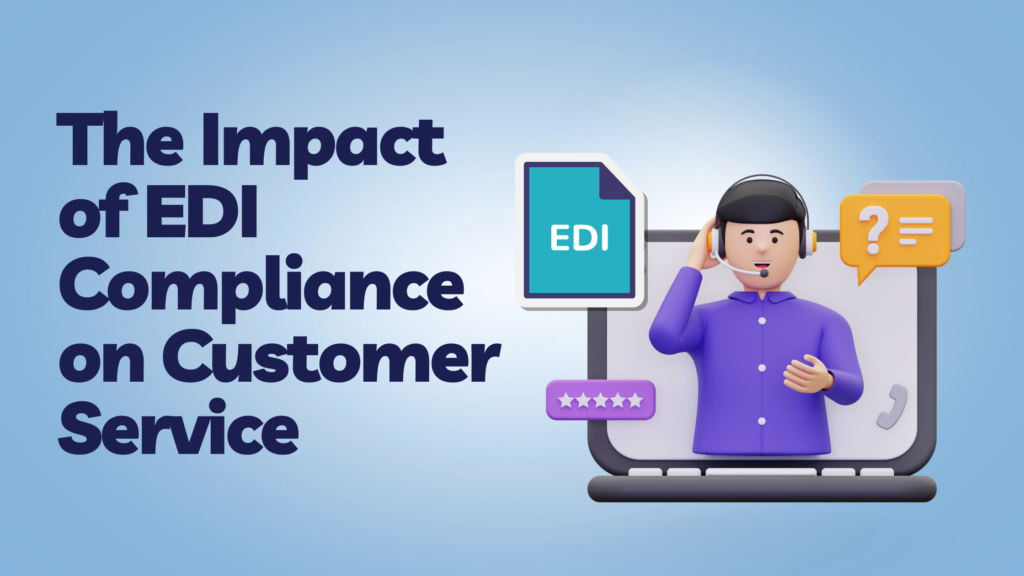The Impact of EDI Compliance on Customer Service
EDI compliance is not just about adhering to technical standards; it’s a critical factor in elevating EDI customer service and strengthening business relationships. By meeting trading partners’ EDI requirements, companies can ensure the seamless exchange of important business documents and foster a reliable service experience.
As businesses strive to provide exceptional EDI customer service, understanding and implementing the right EDI compliance measures becomes essential. The upcoming discussion will delve into the direct impact of EDI compliance on customer satisfaction and explore strategies for enhancing it to gain a competitive advantage.
EDI in Retail Order Processing and Inventory Management
Understanding EDI Compliance
Electronic Data Interchange (EDI) compliance is a multifaceted concept that encompasses the capability to exchange business documents electronically, adhering to the specific requirements set by trading partners. This capability is not only a technical necessity but also a strategic tool that can significantly enhance operational efficiency, improve business relationships, and offer a competitive edge. To achieve EDI compliance, businesses must navigate a series of steps:
- Initial Investment: Companies may incur one-time setup fees ranging from $2000 to $4000, with ongoing monthly fees between $100-300, to become EDI compliant.
- Adherence to Standards: Compliance requires following strict EDI standards to avoid costly errors and chargebacks—financial penalties for non-compliance.
- Expertise and Tools: Becoming EDI compliant demands expertise in software, maintenance, integration, EDI mapping, and translation solutions. It is often recommended to work with a dEDIcated team to ensure continuous compliance.
The risks of non-compliance are significant, including the potential for chargebacks, loss of business with key retailers or suppliers, and reduced return on investment. Conversely, the benefits of compliance are substantial, leading to preferred status with trading partners, efficient processes, reduced errors, and increased productivity, which are especially beneficial in industries such as pharmaceuticals, supply chain, logistics, retail, healthcare, and automobile. It’s essential to understand the unique EDI compliance mandates created by individual retailers, which standardize communications and streamline processes across the supply chain.
The Direct Impact of EDI Compliance on Customer Service
EDI compliance is a cornerstone for businesses aiming to provide superior customer service, particularly when partnering with major trading entities like Walmart and Home Depot. These entities require their business partners to adhere to specific EDI standards, which are crucial for the fundamental operations of receiving purchase orders and sending invoices. As these requirements can shift without notice, businesses must remain agile to maintain compliance and thus preserve trust-based relationships with trading partners.
The implementation of EDI offers tangible benefits that directly enhance the customer experience. It streamlines transactions, making small businesses more efficient partners by improving order accuracy, expEDIting payments, and fostering clearer communication. This efficiency not only satisfies current customers but also attracts new ones, contributing to higher satisfaction levels that can drive operating margins and revenue growth. Furthermore, for small businesses, EDI compliance is not merely a mandate from larger companies but a strategic opportunity to stand out in crowded marketplaces and cultivate long-term, profitable relationships.
At its core, EDI minimizes the need for manual data entry and verification, thereby reducing the occurrence of errors and disputes. This leads to faster and more accurate order processing, invoicing, and delivery, aligning with customer expectations for efficiency and reliability. Additionally, by integrating systems and processes, EDI creates a seamless workflow between businesses and their customers, which is essential for meeting service level agreements and avoiding chargebacks. The transparency and collaboration fostered by EDI compliance are invaluable for building robust customer relationships, providing businesses with a competitive edge through cost reduction, resource optimization, and innovation.
Common Challenges in Achieving EDI Compliance
Achieving EDI compliance presents a range of challenges, each with the potential to impact a brand’s market presence and customer acquisition strategy negatively. The risks of EDI non-compliance extend beyond operational hiccups, hurting brand awareness and the ability to attract new customers, ultimately inflating customer acquisition costs. Moreover, non-compliance can trigger chargebacks, which are not just slap-on-the-wrist fines but significant financial penalties that can exceed the costs of initial compliance by a substantial margin.
Chargebacks related to EDI non-compliance can vary widely, ranging from hundreds to thousands of dollars per violation. These penalties can accumulate rapidly, leading to a considerable and avoidable loss of revenue over the course of a year. In addition to financial repercussions, non-compliance can result in document rejection, tarnished scorecards, fines, transaction delays, and, most critically, damaged relationships with trading partners—outcomes that can have long-term effects on business stability and growth.
The complexity of EDI compliance is further compounded by the fact that mandates differ from one retailer to another, with potential discrepancies in product information, shipping notices, catalogs, and acknowledgments. Suppliers often encounter issues such as:
- Incorrect or incomplete Advance Shipping Notices (EDI 856)
- Rejected EDI Invoices (EDI 810 and 880)
- Missing Purchase Order Acknowledgement (EDI 855)
- Failed Functional Acknowledgements (EDI 997)
With over 100 unique types of EDI documents in existence, managing in-house EDI compliance becomes a complex and resource-intensive task, demanding significant investment in time and expertise.
Strategies for Enhancing EDI Compliance to Boost Customer Service
To elevate EDI compliance and thereby boost customer service, businesses must adopt a multifaceted approach that incorporates flexibility, automation, and continuous improvement. Here are key strategies:
- Flexibility in Scaling: A modular EDI solution allows for individual scaling to meet changing customer demands, ensuring functionality remains unaffected.
- Intelligent Automation: Implementing tools with advanced rules and algorithms minimizes manual tasks and expEDItes transactions.
- Scalable SaaS Infrastructure: Cloud resources in a SaaS model adjust to transaction volumes, maintaining performance.
- Streamlined Integration Management: Simplifying onboarding with documentation and support ensures seamless connections.
- Continuous Monitoring: Identifying and addressing bottlenecks ensures the EDI system is primed for growth.
- Robust Technical Support and Training: Providing assistance and training enhances customer satisfaction and loyalty.
- Proactive Data Analysis: Understanding usage patterns allows for anticipation of scalability needs.
- Specialized EDI Providers: Partnering with experienced providers guarantees service quality and support.
Incorporating these strategies into daily operations is essential. For instance:
- Integrate Standards: Seamlessly blend compliance standards into daily workflows.
- Re-evaluate Practices: Continually seek new efficiencies in business practices.
- Benchmarking: Create and measure key supply chain process benchmarks.
- Vendor Compliance Workshops: Attend workshops to improve scores and demonstrate commitment.
- EDI Integrations: Invest in solutions that support compliance across trading partners.
- Retail Partner Engagement: Maintain communication to align with partner needs.
- Sales Team Education: Ensure the sales team understands the value of compliance efforts.
By integrating EDI with other business systems like ERP, CRM, and ecommerce platforms, businesses can achieve comprehensive process integration, automate the upstream supply chain, and provide faster processing times through automated data from online orders. These initiatives not only support compliance but also foster tighter supply chain relationships, meet compliance requirements, and facilitate quick, cost-effective business growth.
Conclusion
Throughout our exploration, we’ve underscored the indisputable link between EDI compliance and exceptional customer service. Not only does adherence to EDI standards streamline business processes, but it also fortifies partnerships and amplifies customer satisfaction, creating a robust foundation for market growth and competitive advantage. These efforts, while demanding, pave a clear path towards operational excellence and the delivery of seamless service experiences that both retain and attract customers.
In cultivating such a business environment, the importance of flexibility, automation, and continuous improvement in fostering compliance cannot be overstated. As we move toward a more interconnected commercial landscape, the ability to adeptly navigate requirements and maintain compliance is crucial for business success. For those ready to embark on this journey, the strategic adoption of sophisticated EDI solutions can serve as a catalyst for change, enhancing overall customer experiences and reinforcing industry presence. Discover how to streamline your business’s EDI processes and elevate your customer service by exploring tailored EDI solutions here.




